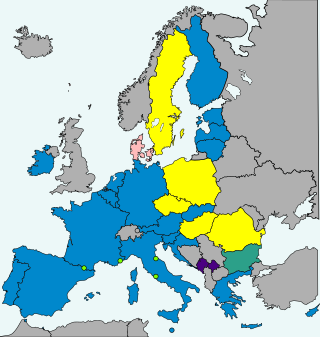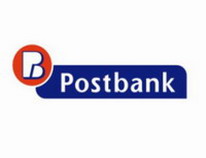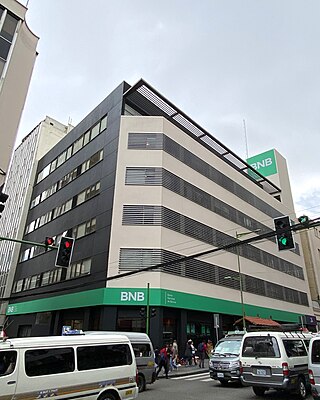
The economy of Bulgaria functions on the principles of the free market, having a large private sector and a smaller public one. Bulgaria is an industrialised high-income country according to the World Bank, and is a member of the European Union (EU), the World Trade Organization (WTO), the Organization for Security and Co-operation in Europe (OSCE) and the Organization of the Black Sea Economic Cooperation (BSEC). The Bulgarian economy has experienced significant growth (538%), starting from $13.15 billion and reaching estimated gross domestic product (GDP) of $86 billion or $203 billion, GDP per capita of $31,148, average gross monthly salary of 2,009 leva, and average net monthly salary of $2,102 (2022). The national currency is the lev, pegged to the euro at 1.95583 leva for 1 euro. The lev is the strongest and most stable currency in Eastern Europe.

The euro is the official currency of 20 of the 27 member states of the European Union. This group of states is officially known as the euro area or, more commonly, the eurozone. The euro is divided into 100 euro cents.

The economy of Poland is an industrialised, mixed economy with a developed market that serves as the sixth-largest in the European Union by nominal GDP and fifth-largest by GDP (PPP). Poland boasts the extensive public services characteristic of most developed economies. Since 1988, Poland has pursued a policy of economic liberalisation but retained an advanced public welfare system. This includes universal free public healthcare and education, extensive provisions of free public childcare, and parental leave. The country is considered by many to be a successful post-communist state. It is classified as a high-income economy by the World Bank, ranking 20th worldwide in terms of GDP (PPP), 21st in terms of GDP (nominal), and 21st in the 2023 Economic Complexity Index.

The economy of San Marino is a developed free-market economy focused on industries such as tourism, banking, and the manufacture of ceramics, clothing, fabrics, furniture, paints, spirits, tiles, and wine. Taken together, the manufacturing and financial sector make up more than half of the national GDP. The primary sector contribution to the GDP of the country is marginal, with the main agricultural products being wine and cheeses. In addition, San Marino sells collectible postage stamps to philatelists.

The lev is the currency of Bulgaria. In old Bulgarian, the word "lev" meant "lion"; the word "lion" in the modern language is lаv. The lev is divided in 100 stotinki. Stotinka in Bulgarian means "a hundredth" and in fact is a translation of the French term "centime." Grammatically, the word "stotinka" comes from the word "sto".
The National Bank of Greece is a global banking and financial services company with its headquarters in Athens, Greece. It is the largest Greek bank by total assets.
Small and medium-sized enterprises (SMEs) or small and medium-sized businesses (SMBs) are businesses whose personnel and revenue numbers fall below certain limits. The abbreviation "SME" is used by international organizations such as the World Bank, the OECD, European Union, the United Nations, and the World Trade Organization (WTO).

Financial services are economic services tied to finance provided by financial institutions. Financial services encompass a broad range of service sector activities, especially as concerns financial management and consumer finance.

Piraeus Bank is a Greek multinational financial services company with its headquarters in Athens, Greece. Piraeus Bank's shares have been listed on the Athens Stock Exchange (ATHEX) since January 1918.

The Bulgarian National Bank is the central bank of the Republic of Bulgaria. It has also been Bulgaria's national competent authority within European Banking Supervision since 2020.

The economy of the European Union is the joint economy of the member states of the European Union (EU). It is the second largest economy in the world in nominal terms, after the United States, and the third largest at purchasing power parity (PPP), after China and the US. The European Union's GDP is estimated to be $19.35 trillion (nominal) in 2024 or $26.64 trillion (PPP), representing around one-sixth of the global economy. Germany has the biggest national GDP of all EU countries, followed by France and Italy.

United Bulgarian Bank (UBB) is one of the leading Bulgarian commercial banks. It is the first and largest banking consolidation project in Bulgaria, accomplished through the merger of 22 state-owned commercial banks throughout the country. UBB was established on 30 September 1992. The Bank manages assets, worth approximately BGN 6.6 billion and renders services to its clients via nearly 200 branches and banking structures throughout the country. The core business of UBB is being supported through the activity of its subsidiaries, UBB Asset Management, UBB Factoring and UBB Insurance Broker.

Bulgaria plans to adopt the euro and become the 21st member state of the eurozone. The Bulgarian lev has been on the currency board since 1997 through a fixed exchange rate of the lev against the Deutsche Mark and the euro. Bulgaria's target date for introduction of the euro is 1 January 2025, which would make the euro only the second national currency of the country since the lev was introduced over 140 years ago. The official exchange rate is 1.95583 lev for 1 euro.

Ivan Iskrov was the governor of the Bulgarian National Bank from October 2003 to July 2015.

The enlargement of the eurozone is an ongoing process within the European Union (EU). All member states of the European Union, except Denmark which negotiated an opt-out from the provisions, are obliged to adopt the euro as their sole currency once they meet the criteria, which include: complying with the debt and deficit criteria outlined by the Stability and Growth Pact, keeping inflation and long-term governmental interest rates below certain reference values, stabilising their currency's exchange rate versus the euro by participating in the European Exchange Rate Mechanism, and ensuring that their national laws comply with the ECB statute, ESCB statute and articles 130+131 of the Treaty on the Functioning of the European Union. The obligation for EU member states to adopt the euro was first outlined by article 109.1j of the Maastricht Treaty of 1992, which became binding on all new member states by the terms of their treaties of accession.

The European Banking Authority (EBA) is a regulatory agency of the European Union headquartered in La Défense, Île-de-France. Its activities include conducting stress tests on European banks to increase transparency in the European financial system and identifying weaknesses in banks' capital structures.

Postbank, legally known as Eurobank Bulgaria AD, is a universal bank in Bulgaria.

European Banking Supervision, also known as the Single Supervisory Mechanism (SSM), is the policy framework for the prudential supervision of banks in the euro area. It is centered on the European Central Bank (ECB), whose supervisory arm is referred to as ECB Banking Supervision. EU member states outside of the euro area can also participate on a voluntary basis, as was the case of Bulgaria as of late 2023. European Banking Supervision was established by Regulation 1024/2013 of the Council, also known as the SSM Regulation, which also created its central decision-making body, the ECB Supervisory Board.
The banking union refers to the transfer of responsibility for banking policy from the member state-level to the union-wide level in several EU member states, initiated in 2012 as a response to the 2009 Eurozone crisis. The motivation for the banking union was the fragility of numerous banks in the Eurozone, and the identification of a vicious circle between credit conditions for these banks and the sovereign credit of their respective home countries. In several countries, private debts arising from a property bubble were transferred to the respective sovereign as a result of banking system bailouts and government responses to slowing economies post-bubble. Conversely, weakness in sovereign credit resulted in deterioration of the balance sheet position of the banking sector, not least because of high domestic sovereign exposures of the banks.

Banco Nacional de BoliviaS.A. (BNB) (English: National Bank of Bolivia) is a Bolivian bank and financial institution headquartered in Sucre, Bolivia. Founded in 1871, it is one of Bolivia's oldest banks. It is also the country's second largest bank by total assets.
















